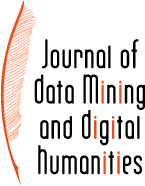 |
Philipp Roelli - On the Usability of Available Digital Tools for Reconstructive TextualEditing
jdmdh:9794 - Journal of Data Mining & Digital Humanities, 27 mars 2023, On the Way to the Future of Digital Manuscript Studies - https://doi.org/10.46298/jdmdh.9794
This article reviews some of the digital tools currently available for reconstructive textual editing. First the main idea of reconstructive textual editing is summarised, then its steps amenable to algorithmic description are compared to similar ones in evolutionary biology. The the unequal ability of its variants to be relationship revealing is an important difference between the two fields. Two Latin texts with a complicated transmission are then introduced and used as data to illustrate some available tools in praxi. The main focus is on stemma reconstruction. Some steps of the process can already be largely automated, especially collating texts. On the whole it is found that tree-constructing software is of little help in the case of the medical text Liber Aurelii, whereas it is somewhat more helpful for Plato of Tivoli’s translation of the Centiloquium. In a concluding part, the main problems for algorithmic approaches to the stemma are discussed: incomplete witnesses leading to only partly overlapping text samples, contamination in some witnesses, and rooting the automatically generated trees.